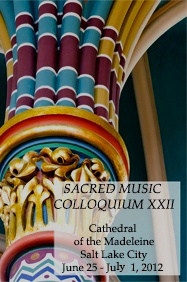This is from CMAA forum (CMAA is cited by Vatican recently as a valuable site on Sacred music. Go to its website, musicasacra.com for the citation)
CommentAuthorfrogman noel jones
It also may boil down to one's own perception of where one stands in relation to God. Is it proper for us to think:
Jesus, my Lord, my God, my All
or
I am the bread of life.
Look at the capitals. In our prayer, in our study of the scripture, where are we in relation to God? And someone more knowledgeable than I needs to post and tell me what our singing of texts that place us not only on a level with God, but saying the words of God, does to our thinking and understanding.
We are charged in the article from Zenit above to understand the importance of scripture.
""The Word was made flesh and dwelt amongst us" this is the foundation of our faith. However, the same Word who took flesh in Mary's womb, who died, rose and ascended, is the same one who said, "This is my body … this is my blood," and is thus present body, soul and divinity under the species of bread and wine.""
The person who says the words "This is my Body ... this is my Blood" at Holy Mass has been chosen by God to say those words and we, as Catholics are not allowed to say those words during the Mass with him. Some may think this is not important. Some may think they have every right to say these words. Some think that they as women may say these words and validly consecrate bread and wine.
Where is the line drawn?
FROM THE GEORGIA OUTDOOR NEWS: concerning the name of God.
Bishop Arthur Serratelli, chairman of the U.S. bishops' Committee on Divine Worship, in a note informing prelates of the Vatican directive, said the indications "do not force any changes to official liturgical texts," but might cause "some impact on the use of particular pieces of liturgical music in our country as well as in the composition of variable texts such as the general intercessions for the celebration of the Mass and the other sacraments."
"The Vatican goes on to note that this practice had "important implications" for New Testament Christology.
"When in fact, St. Paul, with regard to the crucifixion, writes that 'God has highly exalted him and bestowed on him the name which is above every name" (Phil 2:9), he does not mean any other name than 'Lord,' for he continues by saying, 'and every tongue confess that Jesus Christ is Lord' (Phil 2:11; cf. Isaiah 42:8: 'I am the Lord; that is my name')," the Vatican note explained.
"The attribution of this title to the risen Christ corresponds exactly to the proclamation of his divinity," it continued. "The title in fact becomes interchangeable between the God of Israel and the Messiah of the Christian faith, even though it is not in fact one of the titles used for the Messiah of Israel."
"Avoiding pronouncing the tetragrammaton of the name of God on the part of the Church has therefore its own grounds," the Vatican concluded. "Apart from a motive of a purely philogical order, there is also that of remaining faithful to the Church's tradition, from the beginning, that the sacred tetragrammaton was never pronounced in the Christian context, nor translated into any of the languages into which the Bible was translated.""
---------
Here Rome says it is not right to pronounce this name and admits that this is only a problem in songs and intercessions...is what is really being said here is this?
You have taken it upon yourselves to pronounce the name of God, which is forbidden, and now it must stop.
How soon will Rome tell us to purge more than just this....and return to purity of scripture.
----------------------
Perhaps the language currently being used by the Church to articulate the Real Presence of Jesus in the Eucharist is lacking. When traditional hymns like Panis angelicus and Ave verum corpus are supplanted by "Christ has no body now but ours" and "You and I are the bread of life", is it any wonder that Catholics don't see the Eucharist as Jesus Christ present under the forms of bread and wine? Good catechesis on the Real Presence requires sensitive language, sacred language. If we use secular terminology like "plate" instead of "paten" and "cup" instead of "chalice", eventually we'll use the word "picnic" instead of "banquet".
See http://thecrossreference.blogspot.com/2008/06/liturgy-what-is-sacred-language-and-why.html for the rest of this interesting commentary.
Subscribe to:
Post Comments (Atom)

No comments:
Post a Comment